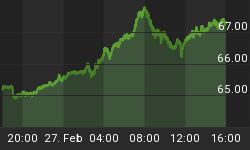As the Japanese government continues holding short-term interest rates near zero while printing yen like it is going out of style, getting out of the yen has now replaced pachinko as the national pastime for rank and file Japanese. With housewives and cab drivers debating the best techniques to exchange their yen savings for higher yielding non-yen assets, the Japanese monetary authorities are facing the prospect of the complete destruction of their own currency, subjecting their citizens to the horrors of hyperinflation.
For years, the storied efficiency of the Japanese economy has kept its citizens from understanding just how much purchasing power they were losing to inflation. As the extremely productive Japanese economy worked to lower consumer prices, the inflationary monetary policy of the BOJ reversed those declines, robbing Japanese consumers of the benefits of falling prices. This loss represents a massive subsidy to American consumers.
However, inflation is about to get so out of control in Japan that prices will soon rise despite the natural forces that would otherwise have lowered them. As rising prices become impossible to ignore, perhaps the Japanese will borrow a page from the U.S. playbook and recalculate their CPI to hide the grim reality. However, with the carry trade kicking into high gear, such propaganda efforts will likely not succeed.
The Japanese are pursuing this reckless monetary policy with the deliberate goal of creating inflation, and they are in danger of succeeding beyond their wildest dreams. Despite the tendency of central bankers to argue that consumers are better served by rising prices rather than falling prices, "deflation" was never a real threat to Japan. On the contrary, falling consumer prices are one of the natural rewards that people enjoy in market economies. The fact that this benefit has been denied to most people in modern times as a result of government created inflation is one of the great tragedies of our time. To spare its citizens from suffering the "scourge" of being able to buy products at lower prices, the Japanese are close to destroying one of the greatest savings hordes in history. The question is why are they doing it?
The only logical answer I can offer is that the Japanese realize that if they stop the flow of global liquidity they will destroy the dollar and the U.S. economy. To survive, the U.S. must be able to both limitlessly exchange the dollars it prints for the goods the rest of the world makes and then pay low rates of interest on its IOU's that foreigners accumulate as a result. Were the Japanese to turn off the monetary spigot and raise interest rates to normal levels, Americans would not be able to do either.
A real rate of interest on the yen would reverse the carry trade by creating demand for Japanese assets and diminishing demand for dollar denominated assets. Such a move would simultaneously send U.S. interest rates and consumer prices thought the roof and stock and real estate prices through the floor. The entire U.S. consumer economy would collapse and Americans would experience the greatest period of economic hardship since the Great Depression.
This scenario apparently terrifies the Japanese, as they fear that such a severe recession in American means similar problems for Japan. However, their fears are misplaced as their real problem is the enormous cost of trying to prevent this from happening. Their fixation on what might happen to Japan if the American economy were to run off the rails has blinded them to the far greater costs of trying to keep in on track.
Therefore, the Japanese need to carefully consider what they are doing. They need to ask themselves whether propping up the U.S. economy, merely delaying its inevitable collapse, is really worth the destruction of their own currency and the potential chaos that might create for their own economy? Do they really want to commit economic hara kiri just to keep their short-sighted vendor financing scheme going a while longer. Hyper-inflation would be the monetary equivalent of an atomic bomb. Will the Japanese really let us do it to them again? If they come to their senses soon, as they must do to avoid this fiasco, this time it will be the Japanese that drop the atomic bomb on us!
For a more in depth analysis of the tenuous position of the Americana economy and U.S. dollar denominated investments, read my new book "Crash Proof: How to Profit from the Coming Economic Collapse." Click here to order a copy today.
More importantly, don't wait for reality to set in. Protect your wealth and preserve your purchasing power before it's too late. Discover the best way to buy gold at www.goldyoucanfold.com, download my free research report on the powerful case for investing in foreign equities available at www.researchreportone.com, and subscribe to my free, on-line investment newsletter at http://www.europac.net/newsletter/newsletter.asp.















